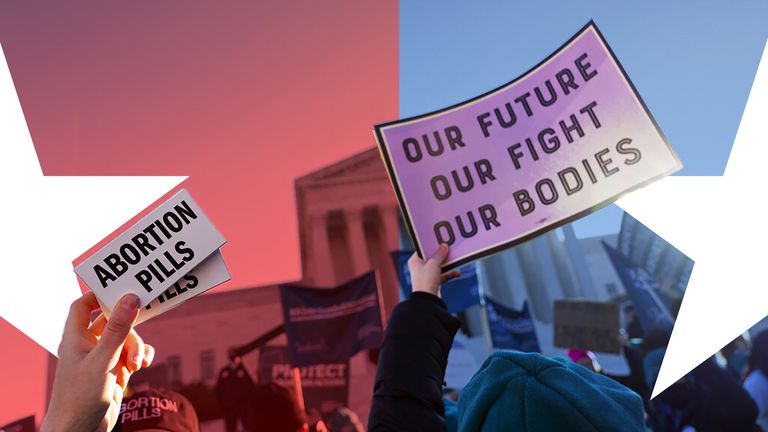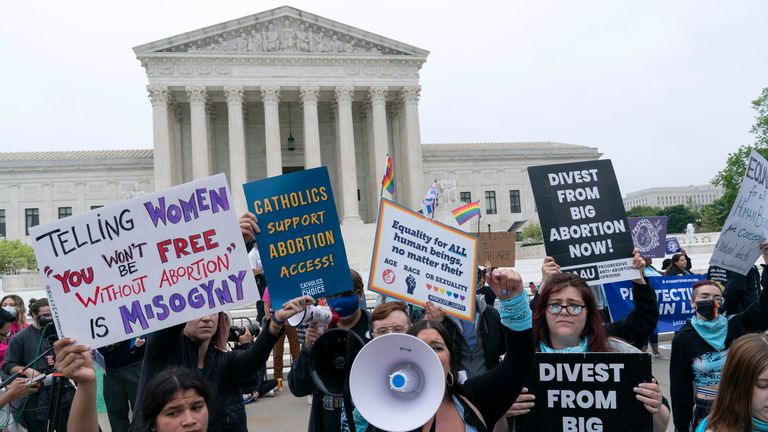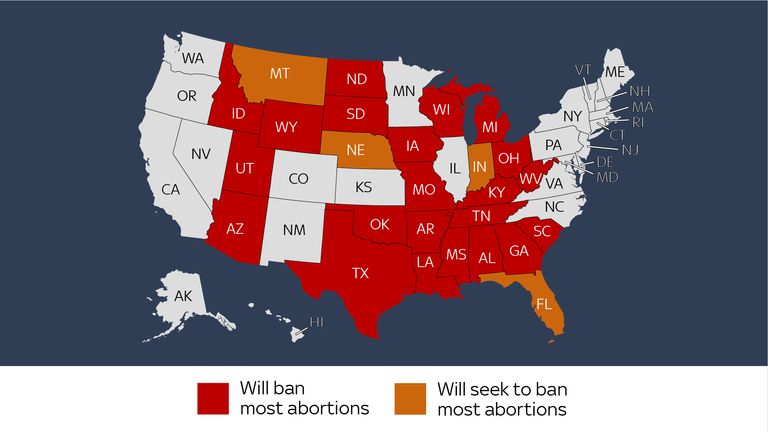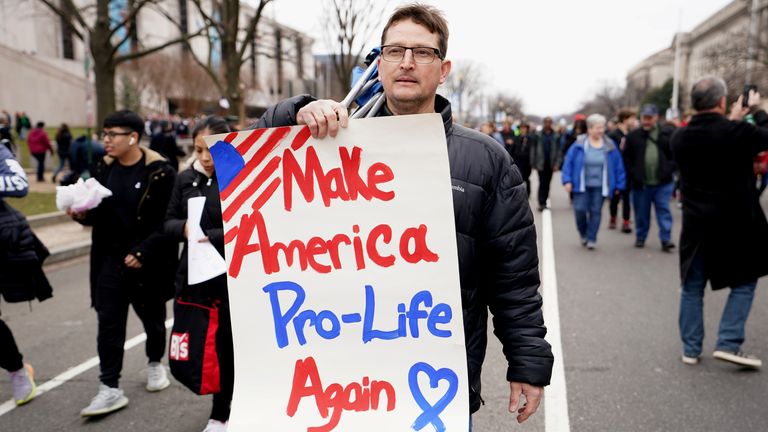Roe v Wade: What happens now the Supreme Court has overruled the constitutional right to an abortion?
Constitutional law expert Professor Corey Brettschneider told Sky News that this week's Supreme Court ruling on abortion rights could have farther-reaching consequences in other parts of society in the US.
Friday 24 June 2022 23:22, UK
The US Supreme Court has overturned the constitutional right of American women to have abortions.
On 24 June 2022, six out of nine Supreme Court justices voted in favour of upholding the 2018 Mississippi state ban on abortions after 15 weeks of pregnancy.
Roe v Wade overturned by Supreme Court - follow live updates
But the Dobbs v Jackson Women's Health Organization case doesn't only affect Mississippi.
In arguing its case, the state went a step further, asking the court to overrule the two most fundamental pieces of abortion legislation in the US - Roe v Wade and Planned Parenthood v Casey.
Overturning them effectively removes the right to an abortion from the US Constitution and places power in the hands of state legislatures instead.
What is Roe v Wade and Planned Parenthood v Casey?
Roe v Wade was the landmark case of a Texan woman, Norma McCorvey, who was referred to by the legal pseudonym of Jane Roe to protect her privacy.
In 1969, she became pregnant with her third child and was unable to get an abortion because the state only allowed them if the mother's life was in danger.
Her lawyers brought a case against the local district attorney Henry Wade to the US Federal Court, claiming Texan abortion laws were unconstitutional.
The District Court for the Northern District of Texas ruled in her favour, but Mr Wade appealed against the decision at the Supreme Court.
After hearing the arguments, in 1973 the court revealed seven of its nine justices had voted in favour of Ms Roe.
This meant a change to the constitution and that regardless of any state laws banning abortion, every woman in the US has the right to one within the first 12 weeks of pregnancy - and some rights to one beyond that.
Another ruling - Planned Parenthood v Casey in 1982 - built on Roe v Wade by putting more abortion rights into the constitution.
It ruled that states could have their own laws on abortion, but could not include anything that creates an "undue burden" or "substantial obstacle" to a woman seeking an abortion up to 24 weeks.
Specifically, the Pennsylvania Abortion Control Act's requirement to notify a woman's spouse before having a termination was deemed unconstitutional.
Why do they matter to this ruling?
The Dobbs v Jackson Women's Health Organization case was about a piece of legislation passed by the state of Mississippi in March 2018, banning abortions after 15 weeks, with no exceptions for rape or incest.
Dobbs, on behalf of the state, did not just argue that it should be allowed to enforce the ban, but that the constitutional abortion rights enshrined in Roe v Wade and Planned Parenthood v Casey be revoked too.
By ruling in favour of Dobbs, the Supreme Court has effectively got rid of the guarantees on abortion rights provided by the 1973 and 1982 cases, putting laws into the hands of individual states instead.
This means that 22 of 50 states will now move to ban abortion as soon as possible.
Professor Corey Brettschneider, who specialises in constitutional law at Brown University, says: "Put simply, Republican-nominated states won't allow abortion and Democrat-nominated ones will."
Bans can be enforced via anti-abortion laws that were in place before 1973, 'trigger laws' that enforce a ban automatically in the event of Roe v Wade being overturned, near-total abortion bans that were previously blocked by Supreme Court orders, and amendments to their own state constitutions that block Roe abortion rights.
Some states also have six or eight-week abortion bans already in place.
A further four states - Florida, Indiana, Montana and Nebraska have introduced legislation similar to the ban introduced in Texas last year - which means they are likely to move towards banning terminations too.
Although eight have not made their positions clear, 16 states and Washington DC have their own laws that protect abortion rights beyond the Roe v Wade ruling, which means that despite the Supreme Court decision, abortion there will remain legal.
Those states include California, New York, Washington and Oregon.
What happens now?
The Supreme Court's ruling on the Mississippi case revolved around the constitutional right to privacy under the 14th amendment, which justices used to back Roe in the 1973 case.
Now they have revoked that right to privacy - to seek an abortion without the intervention of the authorities - and overruled Roe v Wade.
Professor Brettschneider, an expert in political science, says that removing privacy rights from the constitution could have consequences beyond abortion bans.
"The immediate result of this will be that states can now ban abortion," he tells Sky News.
"But it's more political than that. The Supreme Court is changing the fundamental way we have been approaching the constitution for years.
"There has been a Conservative shift towards what we call originalism - keeping the text of the constitution as it was to begin with.
"By saying that there is no explicit right to privacy in the constitution, they're suggesting that a whole slew of laws based on that right to privacy are now incorrect.
"Access to contraception and gay rights - neither seem to be compatible with no right to privacy."
The ruling also gives more weight to the rights of the unborn child, as not just a 'potential person' but a person with the constitutional right to life, Professor Brettschneider adds.
This shift could give rise to more prosecutions of mothers who undergo illegal abortions.
Read more:
Activists prepare for state bans with abortion pills
Two thirds of Americans will back abortion right candidates in mid-terms
With constitutional guarantees on abortion gone, President Joe Biden and Democrats in Congress are now likely to bring forward a federal law that enshrines abortion rights.
But this is unlikely to pass given the filibuster in the Senate, which Republicans can use to stop bills passing, and one attempt has already failed.
He also says that back in the Supreme Court, the appointment of three Conservative Republican justices by former President Donald Trump is resulting in its increasing "politicisation".
"The Supreme Court has always been seen as apolitical, a check on the passions of politics - but it doesn't look like that anymore," he adds.
"Now it has a very specific political agenda. And that's a new issue that I predict will prove very controversial."






